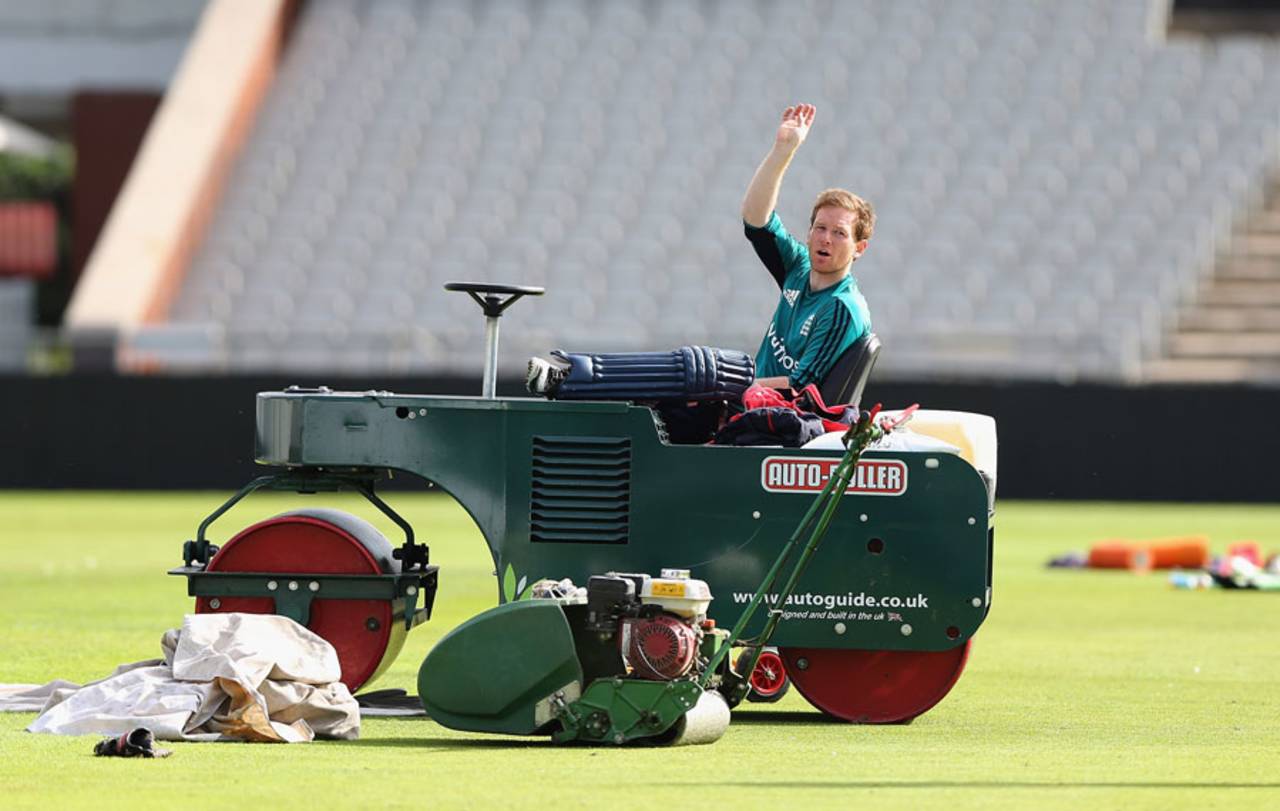Morgan's problem
He has been a galvanising, socialising force in England's limited-overs cricket, but does not enjoy the support that Alastair Cook does
Jon Hotten
Sep 7, 2016, 10:20 AM

The solidity of Morgan's leadership exerts a powerful inward gravity on the team • Getty Images
One look at him tells you that he is both an athlete and an orderly man. His kit, of whatever hue, is usually pristine and there is a sense of precision and economy to everything he says and everything he does. Nothing is wasted. He moves with the same grace noticeable in most of the best cricketers. Moreover, he looks like a player, his eyes have that same narrowed stare that Steve Waugh's did, and all of the playing and training and discipline are obvious in the hard planes of his face. It adds up to something, a sense of substance, an authority that separates him from his team, gives just the amount of distance that leaders need.
Cricket moves fast these days, and the days run away. Pictures of Eoin Morgan at his early photocalls are of a wider-eyed, softer-faced kid, not yet toughened by real failure or defeat, and so far unstopped. His first-class debut had come not for a county side but for Ireland against Scotland in Dublin, where in his maiden innings he made a three-ball duck. He was already an outsider, and already talked about, a batsman who seemed innately tuned in to the new information beginning to thrum through the game, a player with a technique of hitting late with an almost audible hiss of bat speed, especially when he whipped the ball, reverse-style, backwards of square.
Here began the myth, the notion that some of this weird invention came from a life of hurling, a colloquial Irish sport. It offered him the kind of otherness that brings originality to an ancient but changing game. And this was 2004: in terms of getting funky, he was George Clinton, an originator of the form. Yet like the flamingo and the switch hit soon coined by his sometime soulmate and another of England's great outsiders Kevin Pietersen, there were hours of thought and practice put into their conception: Morgan was obsessed with cricket.
Across a career that qualifies effortlessly as a modern enigma - periods of incandescent run-making in big matches under heavy pressure cut through with fathomless dry spells as long as a desert summer - he hinted at significance if not quite greatness. It's a sadness that his time as a Test batsman didn't quite catch: he was at one point in the position that Jos Buttler is in now, perched on the edge and wondering if his style fits, and if the five-day game will forever be a road not taken. He would have been a strong Test match captain had his batting worked out.
Across a career that qualifies effortlessly as a modern enigma, Morgan hinted at significance if not quite greatness. It's a sadness that his time as a Test batsman didn't quite catch
He may not have felt it when he got Alastair Cook's hospital pass as the 50-over captain just before the World Cup, but he is one of nature's lucky generals. There is serendipity to the rise of this generation of England players coinciding with two consecutive home global tournaments, and Morgan has become their galvanising force, insisting rather than hoping that their cricket move towards the cutting edge.
But there is not the unanimity of support that Cook now enjoys from the public. Morgan's vacillations with the bat, and the amount of talent floating on the edges of the team, bring regular calls on social media for him to lose his place.
They come from people who don't understand his power or his role. The solidity of his leadership exerts a powerful inward gravity on his team. It's a socialising force, offering a creative, progressive environment in which anything is possible. "He is not playing a PR Game. He has the power of his convictions," Angus Fraser told the writer John Stern earlier this year.
Morgan may have slid towards the establishment, but he is an uncompromising character, an Irishman who plays for England. He has been unconvinced about the trip to Bangladesh and he's sure enough of himself to pull out if he doesn't feel it's right.
Writing in the Telegraph, Morgan's old ally Kevin Pietersen had a warning for him should he not lead the team on tour: "When the going gets tough for him in the future, with the team losing, or a run of personal low scores, then he will find that the loyalty from his bosses will not be the same because he went against them."
He and Pietersen seem to read the game in the same way, and like Pietersen, Morgan has enough swagger to make top dollar on the franchise circuit should he have to make a go of it there. You suspect also that he shares KP's opinion that it is "too early" to predict that the team will win these major tournaments with or without him, but if the cards fall his way, he will go down, like Hussain, Vaughan and Strauss, as a transformative figure in England's recent history.
Jon Hotten blogs here. @theoldbatsman